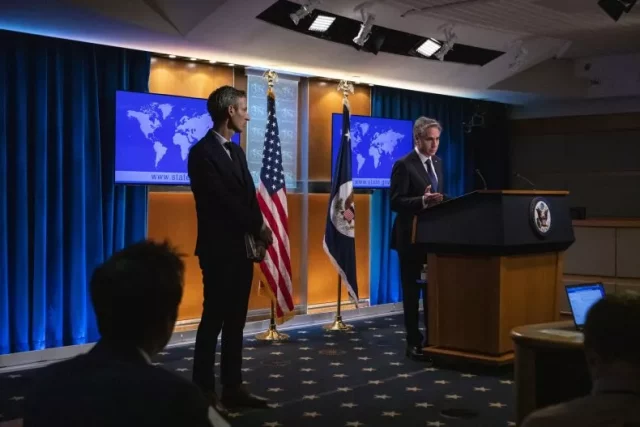After a wave of terror attacks against Israelis by Palestinians, who are educated by the Palestinian Authority and UNRWA to see murder and suicide as laudable, Israeli Prime Minister Benjamin Netanyahu announced the legalization of nine formerly unauthorized communities in Judea and Samaria. It was a great move—nonviolent and aimed precisely at what the Palestinian leadership and its terrorist foot soldiers don’t want: more Jews in the disputed territories.
It was, shall we say, the “grown up” thing to do.
The U.S. response, by contrast, was infantile. Indeed, State Department Spokesman Ned Price had a veritable temper tantrum. “The U.S. is deeply troubled by Israel’s announcement that it will reportedly advance thousands of settlements and begin a process to retroactively legalize nine outposts,” he declaimed. Francesca Albanese, the UN special rapporteur, rebuked Price, saying, “The construction of thousands of colonies in occupied land constitutes a war crime, not a ‘unilateral measure.'”
In a podcast with political activist David Axelrod, U.S. Ambassador to Israel Thomas Nides made clear his contempt for the country to which he makes American representation. Nides said, “We’re telling the prime minister— as I tell my kids—’pump the brakes,’ slow down, try to build a consensus, bring the parties together.”
That “I know better” attitude is not new for Nides. Toward the beginning of this administration, Nides told an audience at the Institute for National Security Studies—a security-oriented forum of active and retired military and intelligence personnel—that President Joe Biden “fully and completely believes a two-state solution is best for Israel.”
Then came the kicker: “We want to see that neither side does stupid things.” Stupid things, that is, by stupid children.
You can blame New York Times columnist Tom Friedman, for his recent infantilization of Israel. He did, after all, write a column titled “The Israel we Knew is Gone” after the election in November. Is it rude to point out that many things Friedman once knew are now also gone: LPs, tape recorders, land phones, and “The Jetsons?”
Friedman was joined in December by out-of-date Oslo-era “peace processers” Daniel Kurtzer and Aaron David Miller, offered a prescription for U.S. relations with Israel. That prescription was a large, threatening hammer, wielded by two people with a lot of experience failing in Middle East negotiations, substituting Washington’s judgment for Israel’s and punishing where necessary. Weapons sales, UN votes, support for the Abraham Accords—wherever Israel messes up, in essence.
It is easy to dismiss Friedman, Kurtzer, and Ross. They mean nothing in the real world, although they apparently echo in the head of the president’s minions.
Nides is a different story. Israel’s real-life, adult experiences have led its people and its government to grow up. But Nides, in pursuit of a comprehensive deal with both Palestinians and Iranians bent on Israel’s destruction and his unrealistic attachment to the dead Oslo Accords, is way behind.
The so-called “Second Intifada”—more precisely, the Palestinian jihad against Israel—began in late 2000 when Yasser Arafat decided he couldn’t hold to the fiction of two states any longer. He ginned up his people in a war against Israel that killed more than 1,000 people. The U.S. equivalent, adjusted for national population, is more than 40,000 people: More than twelve 9-11s in under five years.
If you don’t think that had an impact on Israel’s view of its security requirements, think again.
Israel’s withdrawal from Gaza in 2005—taking Jewish bodies from the cemeteries, but leaving hundreds of thousands of dollars of greenhouses and contracts with European countries—resulted in Hamas’s ascension to the top of the Gaza thugocracy, the immiseration of the people of Gaza, and the recurring rocket wars. The Hamas charter says jihad is the only answer to Israel.
If you don’t think this too had an impact on Israel’s national maturation, think again.
In the broader arena, Iran has wrecked Yemen—Israel’s outlet from the Red Sea to the Indian Ocean—as well as Lebanon and Syria, seeking bases and factories for precision-guided missiles and drones on Israel’s borders. All along, Iran continues its progress toward a nuclear weapon, which sometimes features ballistic missiles that have “Death to Israel” written in Hebrew up along the side.
If you don’t think this also has an impact on Israel’s understanding of the threats it faces, think again.
Israel is approaching its 75th anniversary as a modern state, with civilizational roots thousands of years old. Its historic and present experiences are different than those of the United States; its neighbors are different, and the threats to its security and very existence are different.
Nides and the Biden administration should grow up.


